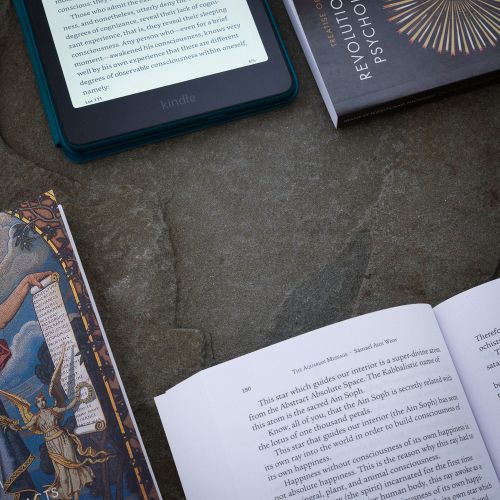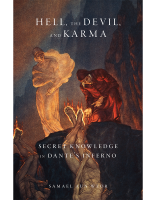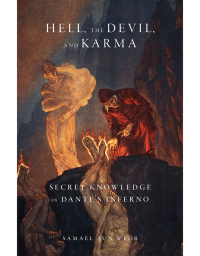The three main religions in the West—Judaism, Christianity, and Islam—share a common belief of a region called hell, where it is said that the souls of the dead suffer eternal punishment. Yet, few who follow those religions realize that their beliefs are like those of the Greeks, Romans, Chinese, Hindus, etc. Few realize that ultimately all religions come from the same root. In this book, that root religion is called Gnosis, a Greek word that means “knowledge,” but implies knowledge acquired from experience. Ultimately, all religions emerged from someone’s experience of truth, and their original purpose was to help us have that same experience. This book has that same purpose.
Hell, the Devil, and Karma was made from a series of lectures given by Samael Aun Weor in Mexico in the early 1970’s. By that time, he had already written scores of books and laid the foundations for the international Gnostic movements. The basis of his writing and teaching was his own gnosis, his own experience. That is why he said,
“...we need to be practical; there are authors who write marvels, but when one looks at them, one realizes that they have not lived what they have written; they did not experience it in themselves, and that is why they are mistaken. I understand that one must write what one has directly experienced by oneself. I have proceeded in this way for my part.” —Samael Aun Weor, Tarot and Kabbalah (1978)
The purpose of this book is to show you how you too can experience the truth, and know for yourself what is real and what is not.
Dante and The Divine Comedy
Ever since the book we know as The Divine Comedy was written some seven centuries ago, there have been piles of commentaries and examinations written about it, but none by an initiate of the secret teachings that Dante knew.
Dante Alighieri was born in 1265 in Florence, Italy. What is known today of his life is based on scraps of documentary evidence: a little note here, a reference there. Otherwise, all that is said of him is what scholars have assumed. While many scholars and readers have noticed that Dante seems particularly mystical, none identified him as an initiate of a mystery school, an esoteric tradition unknown to scholars, intellectuals, and historians. Yet, those who are educated in the esoteric traditions easily recognize their sciences throughout The Divine Comedy.
“Do the arts and sciences that the race has inherited from older nations conceal beneath their fair exterior a mystery so great that only the most illumined intellect can grasp its import? Such is undoubtedly the case.
“Albert Pike, who has gathered ample evidence of the excellence of the doctrines promulgated by the Mysteries, supports his assertions by quoting from the writings of Clement of Alexandria, Plato, Epictetus, Proclus, Aristophanes, and Cicero, all of whom unite in lauding the high ideals of these institutions...
“The preeminence of any philosophical system can be determined only by the excellence of its products. The Mysteries have demonstrated the superiority of their culture by giving to the world minds of such overwhelming greatness, souls of such beatific vision, and lives of such outstanding impeccability that even after the lapse of ages the teachings of these individuals constitute the present spiritual, intellectual, and ethical standards of the race. The initiates of the various Mystery schools of past ages form a veritable golden chain of supermen and superwomen connecting heaven and earth. They are the links of that Homeric “golden chain” with which Zeus boasted he could bind the several parts of the universe to the pinnacle of Olympus. The sons and daughters of Isis are indeed an illustrious line--founders of sciences and philosophies, patrons of arts and crafts, supporting by the transcendency of their divinely given power the structures of world religions erected to do them homage. Founders of doctrines which have molded the lives of uncounted generations, these Initiate-Teachers bear witness to that spiritual culture which has always existed—and always will exist—as a divine institution in the world of men.” —Manly P. Hall
Only those who were initiated into such schools could recognize the works of another educated in those esoteric sciences. Had he written that knowledge openly, publicly, without symbols and veils, he would have been executed. Dante himself said that the “letter is fiction, and the truth is found in the allegory alone.”
For centuries, scholars, intellectuals, and philosophers have expounded theory upon theory attempting to understand Dante’s complex and intricately woven poem, and most, if not all, agree that they appreciate its beauty, but not one of them managed to penetrate its inner meaning. None captured the truth of it, because none were initiated into the secret knowledge that Dante knew.
The Divine Comedy, as the greatest work produced by Dante, is a tremendous work of esoteric wisdom. In it we find an outline of the complete path of liberation from suffering, called in the East “the path the bodhisattva,” a path traveled by very few due to its extreme difficulty. Those who complete it are the most remarkable and incomprehensible human beings: Jesus, Buddha, Krishna. These are not mere “saints” or “good souls,” but revolutionaries.
According to Dante himself, The Divine Comedy reflects a previous work of similar nature: The Aenied, written by the Roman poet Virgil, who in Dante’s time was regarded as the wisest man in history.
The Divine Comedy has three parts: Inferno (Hell), Purgatorio (Purgatory), and Paradiso (Paradise). Each of these is written in 33 short passages called cantos. The number 33 is significant in many traditions, such as the age of Jesus at his resurrection, or the 33 degrees of Masonic initiation, yet these merely represent the 33 vertebra of our spinal column, the very road of our spiritual development, a symbol hidden in several ways by Dante.
In Hell, the Devil and Karma, Samael Aun Weor unveils what Dante could not. Here, you will find the essential clues necessary for beginning the path, a path which begins in darkness and uncertainty, and which, before taking us to the light, must first take us into the very deepest and darkest regions: the hidden depths of ourselves. For that is the singular message of the mysteries themselves: to reach the height of heights, one must first have cleaned the depths in oneself. Even Jesus, before ascending to heaven, had to descend.
Naturally, you are well-advised to read The Divine Comedy before or alongside this book. Nevertheless, we provide you with a brief summary.
Summary of The Divine Comedy
“In exposition, says Dante, “always the literal must come first”; and he adds, “I shall discourse first of the literal meaning, and after that shall treat of the allegorical, that is, the hidden truth.”
The Divine Comedy tells the story of a journey through Hell, Purgatory, and Heaven.
The poet, in the middle of his life, finds himself astray at night in a dark wood. He tries to save himself by climbing a mountain whose top is lit by the rays of the rising sun; but three beasts, besetting his path, are about to drive him back, when Virgil, summoned to Dante’s help by Beatrice, at the bidding of Mary and St. Lucia, appears and offers to guide him. They can escape from the wood only by going down through the earth. This path leads them through the whole of hell, represented by nine circles, where Dante sees the punishment of every kind of sin, and converses with the damned. Hell ends at the earth’s center, the ninth sphere, where they see Lucifer, the shadow of divinity, consuming three significant traitors. From there the poets climb Lucifer’s back in order to depart from hell.
They emerge in the opposite hemisphere in the middle of the ocean, on the shore of an island called Purgatory, which consists mainly of a colossal mountain. Dante and Virgil ascend the steep mountain-side. On their journey they observe repentant souls preparing themselves by discipline for the heavenly life. At the summit, they find Beatrice, the embodiment of divine knowledge.
Beatrice leads Dante into Paradise, the presence of the Almighty. The poem ends with a vision of the Trinity.







